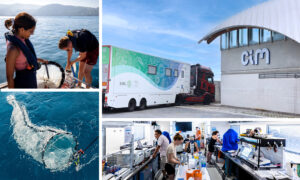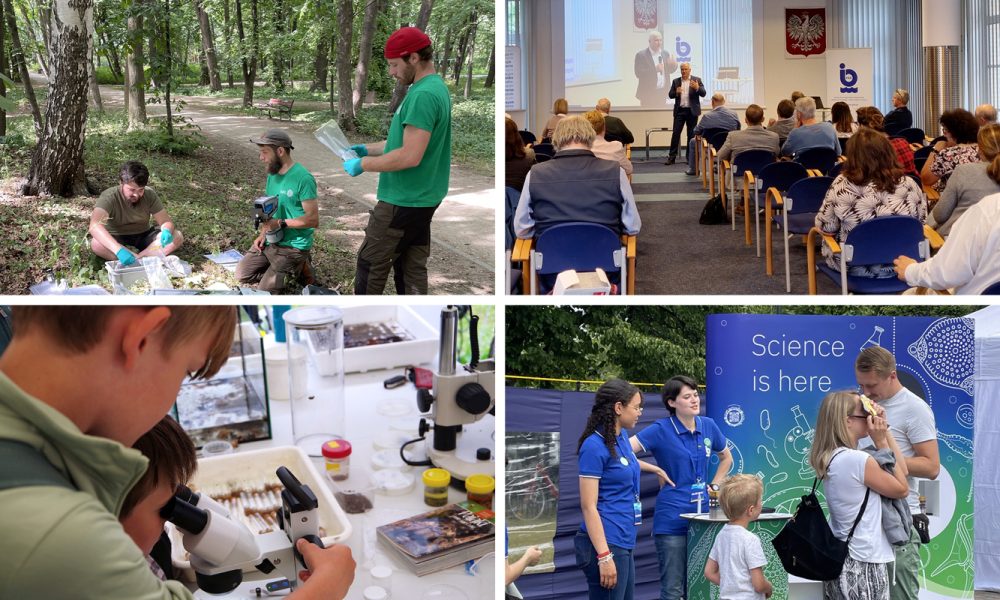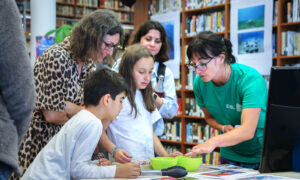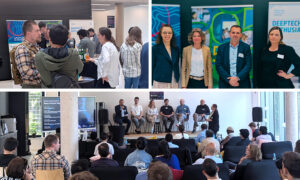
Connecting scientists, engaging citizens
The TREC expedition stop in Sopot offered an opportunity to create connections with Polish scientists and citizens around the topics of planetary biology and ocean science.

The Traversing European Coastlines (TREC) expedition has been underway for two and half months, sampling soil, water, aerosols, and different organisms in France, Belgium, The Netherlands, Denmark, and Germany. Having made their way along the Atlantic, EMBL’s land-based sampling teams and the sea-based sampling team on the Tara schooner are now moving further along the Baltic Sea. One of their latest stops: Sopot in Poland.
The sampling teams took soil and water samples at three different locations around the Bay of Gdansk. In addition, the area hosted a range of activities for the scientific community and general public.
Scientific connections
Poland became EMBL’s 26th member state in 2019. In the same year, the Nencki-EMBL partnership for neural plasticity and brain disorders was established. Since then, the Polish and EMBL scientific communities have cooperated in different ways, including, for example, dedicated events in Poland.
Throughout the expedition, the TREC team is working with numerous national partners and engaging with scientists at the many different stops. The sampling stop in Sopot offered the opportunity to further interactions in Poland and explore new synergies between EMBL and the Polish community, including potential collaborative projects relevant for addressing societal challenges.
A scientific symposium on 15 June, organised by EMBL, the Institute of Oceanology of the Polish Academy of Sciences (IO PAN) – the local partner institute, and the Committees of Molecular Cell Biology and Environmental and Evolutionary Biology of the Polish Academy of Sciences brought together scientists to exchange knowledge and expertise on the science that forms part of the TREC expedition, as well as broader planetary biology research.
EMBL Council delegate for Poland, Leszek Kaczmarek, was one of the organisers of the event. He said: “This meeting was of great value for researchers for several reasons. It allowed us to present the fantastic opportunities offered by EMBL to the wider research community and demonstrated how recent advances in molecular biology may enrich ecological and environmental studies. It also showed how important studies on the environment in planetary biology are and that indeed this is the time for molecular biologists to go outside the comfort zone of their laboratories and venture into the environment to address the most significant challenges facing humanity.”
“I’m very pleased to have been part of this event, bringing together scientists from EMBL and from the Polish Academy of Sciences, but also from the Polish scientific community at large,” said Marek Konarzewski, President of the Polish Academy of Sciences. “In the areas of environmental studies and molecular biology, which are part of the planetary biology programme carried out by EMBL, there are a lot of important areas of common interest and I would see this as the most promising area of future collaboration. Polish scientists will benefit from the collaboration with EMBL in many ways.”
Planetary biology is an area of common interest for Poland and @embl.
— EMBLtrec (@EMBLtrec) June 22, 2023
“I would see this as the most promising area of future collaboration with EMBL,” said Prof. Marek Konarzewski, President of @PAN_akademia, at the symposium at @OceanLab_IOPAN during the #EMBLTrec stop in 🇵🇱. pic.twitter.com/uA0uVcgvst
Planetary biology and biodiversity for the public
In addition to scientific activities, Sopot also hosted a range of activities for the public. Citizens had the opportunity to participate in workshops, exhibitions, and presentations with a focus on ocean science.
At the ‘TREC in the city’ travelling exhibition stand, the public could explore microscopy in a hands-on way.
Under the umbrella of the Sopot Science Day ‘Ocean of Changes’, IO PAN hosted the ‘MARBEFES & BIOcean5D BioBlitz’. The event was set up to engage as many biologists as possible in identifying as many species as possible in a defined publicly accessible site within a 24-hour-period. In addition, the public could hear from many different institutions about their activities, play games, and participate in competitions and workshops during a ‘scientific picnic’.
“We wanted to present the complex nature of the term ‘biodiversity’. There is no one person in the world who could identify all species, even in a simple, well-known public place. We also demonstrated a range of methods – from traditional butterfly nets to new machinery for genomic analyses,” said Jan Marcin Węsławski from the Institute of Oceanology of the Polish Academy of Sciences.
The BioBlitz activities were delivered as part of the two EU-funded projects MARBEFES and BIOcean5D.
“We’ve moved to the planetary science, so we are thinking in a much larger scale than before,” said Prof. Jan Marcin Węsławski, Director of the Institute of Oceanology @PAN_akademia 🇵🇱.
— EMBLtrec (@EMBLtrec) June 23, 2023
Listen to his perspective on #EMBLTrec and bringing together molecular biology & ecology. pic.twitter.com/XjQ2xdSVgD


